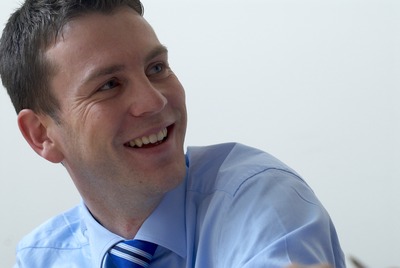In 14 years as a consultant, Lee Griffin has gone from a graduate role in a small consultancy to head of strategy & corporate development, building + places, for a globally-recognised conglomerate, AECOM. We asked him about the key to his success.
How did you become a consultant?
I was doing a business degree at Cardiff Business School and people were starting to talk about management consulting as a profession and a career. I had no experience, but the idea of helping businesses improve performance and the wide-ranging nature of the role appealed to me. My first role as a graduate was in IT consulting at the time when IT was booming. I never looked back.
You’ve risen very quickly to the position you are in now. What has been the key to your success?
I am happy to say I’ve had a fair wind with me all the way. I joined Davis Langdon (now part of AECOM) at a time when it was really growing, and I have worked for, and been mentored by, some fantastic people. Of course, there is no substitute for great client delivery which must be at the heart of any consultant’s career development.
I’ve also always done some sort of extracurricular activity for the firm. Whenever there has been an initiative within Davis Langdon, I was always part of that, in addition to my day job. I always showed willingness not just to help clients but to work for the firm. That helps you stand out a little bit.
You’ve only been a consultant 14 years, but what do you think has changed in that time?
In terms of the last four or five years it’s all been about the economy. In the UK a lot has changed. We’ve seen strong service lines suddenly slow down while other lines gain huge interest from clients, like risk management, and we have grown practices off the back of that. A lot of change comes from the economic shift.
AECOM merged with Davis Langdon in 2010. How well do the engineering and consultancy disciplines sit in a firm, and how does having both add to what you can offer a client?
They have brought a lot to us. AECOM has an unbelievable depth and breadth of capability. It has blossomed from its engineering roots to becoming a truly multidisciplinary and global firm. Whilst one of the core elements of Davis Langdon was consulting (in addition to cost, programme and project management), AECOM has a vast array of strategic consulting capabilities in its own right. A lot of our work now is about integrating these parts for the benefit of our clients.
One of the things that we want to be able to do as a company is the front end consultancy work and take that right through into delivery. It’s delivering change that creates the value for the client, rather than delivering recommendations that go nowhere. Our strength is in implementation and this means that our consultancy advice is based on what is really possible and can be made to happen.
How would you describe 2012 for AECOM?
It’s a pretty young company if you look at its history, but it’s had unbelievable growth and merged with a number of big name firms here in the UK: Davis Langdon, Faber Maunsell, EDAW etc. Last year was really about integrating what we have and really making them work together so we can offer greater benefits to clients. We have simplified and re-structured our business to ensure that this happens.
Working in a global role what is the importance of the UK in the consultancy market?
The expertise found within the UK’s professional skills industry is recognised globally and certainly within our own firm, the UK is seen as a centre of excellence for consulting. Many of the projects we deliver globally we deliver from the UK so it’s hugely significant, even if economically the UK isn’t that strong right now.
What we are trying to do is export our consultancy skill set globally. We’ve got people travelling from the UK to places like Singapore to deliver consultancy work, because they want the skill set that we have in the UK and are willing to pay for it.
What would your advice be for someone just starting out in the consulting industry?
Find yourself a really good role model. Look for a rising star, someone you think is doing really well in the business and find out how they approach things, see if you can get them as your mentor.
It is also important to lap up as much training and development as you can, it brings real benefits. Through Davis Langdon I was sponsored to do an MBA. I look for every opportunity to apply learning from my MBA to what I do, and I think if you really do that it helps you stand out.
And get involved in industry events and professional bodies. I’ve learnt an awful lot from going to those groups and sessions after work. You hear a speaker or discussion and bring the learning back to your business – and in this way you can improve your knowledge and help yourself stand out in your early career.

